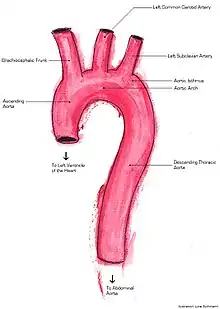| Penetrating atherosclerotic ulcer | |
|---|---|
 | |
| Aorta Anatomy | |
| Specialty | Cardiology |
| Causes | Atherosclerosis |
| Diagnostic method | MRI |
A penetrating atherosclerotic ulcer (PAU) is an atherosclerotic lesion that ulcerates, leading to a hematoma forming within the walls of the aorta.[1]
Cause
Diagnosis
The condition is often associated with thickening of the aortic wall, and can be differentiated from similar conditions (atherosclerotic plaque and a thrombus) through the use of computed tomography and magnetic resonance imaging, though the latter is superior.[2] Transesophageal echocardiography and intravascular ultrasonography may also be used in differentiation.[1]
Treatment
Complications such as rupture or other life-threatening conditions are rare. Treatment may involve surgery, particularly when signs indicating worsening are present (the patient is unable to control their pain or changes in blood pressure).[1]
Notes
- 1 2 3 Hayashi H, Matsuoka Y, Sakamoto I, et al. (2000). "Penetrating atherosclerotic ulcer of the aorta: imaging features and disease concept". Radiographics. 20 (4): 995–1005. doi:10.1148/radiographics.20.4.g00jl01995. PMID 10903689.
- ↑ Chu, B; Yuan C; Takaya N; et al. (March 2006). "Serial high-spatial-resolution, multisequence magnetic resonance imaging studies identify fibrous cap rupture and penetrating ulcer into carotid atherosclerotic plaque". Circulation. American Heart Association. 113 (12): e660–e661. doi:10.1161/CIRCULATIONAHA.105.567255. PMID 16567574. Retrieved 2008-05-28.
External links